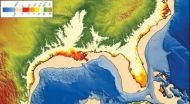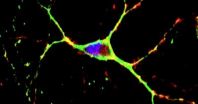(Press-News.org) Some 4.567 billion years ago, our solar system's planets spawned from an expansive disc of gas and dust rotating around the sun. While similar processes are witnessed in younger solar systems throughout the Milky Way, the formative stages of our own solar system were believed to have taken twice as long to occur. Now, new research lead by the Centre for Star and Planet Formation at the Natural History Museum of Denmark, University of Copenhagen, suggests otherwise. Indeed, our solar system is not quite as special as once believed.
Using improved methods of analysis of uranium and lead isotopes, the current study of primitive meteorites has enabled researchers to date the formation of two very different types of materials, so-called calcium-aluminum-rich inclusions (or CAI's for short) and chondrules, found within the same meteorite. By doing so, the chronology and therefore overall understanding of our solar system's development has been altered. The study has just been published in the renowned scientific journal, Science.
4.567 billion years – this is how far back we must travel to experience our nascent solar system. The researchers at the University of Copenhagen Centre for Star and Planet Formation took a closer look at the first three million years of the solar system's development by analysing primitive meteorites composed of a blend of our solar system's very oldest materials. In part, the study confirmed previous analyses demonstrating that CAI's were formed during a very short period of time. The new discovery is that the so-called chondrules were formed during the first three million years of the solar system's development as well. This stands in contrast with previous assumptions asserting that chondrules only started forming roughly two million years after CAIs.
Painting a new picture of the Solar System
"By using this process to date the formation of these two very different types of materials found in the same meteorite, we are not only able to alter the chronology of our solar system's historical development, we are able to paint a new picture of our solar system's development, which is very much like the picture that other researchers have observed in other planetary systems," says James Connelly of the Centre for Star and Planet Formation.
We aren't that special...
Showing that chondrules are as old as CAIs addresses a long-standing question of why chondrule formation should be delayed by up to 2 million years after CAIs. The answer – it is not.
"In general, we have shown that we are not quite as unique as we once thought. Our solar system closely resembles other observable planetary systems within our galaxy. In this way, our results serve to corroborate other research results which indicate that earth-like planets are more widespread in the universe than previously believed," says Professor Martin Bizzarro, head of the Centre for Star and Planet Formation.
###
Read the scientific article "The Absolute Chronology and Thermal Processing of Solids in the Solar Protoplanetary Disk" in the journal Science. DOI: 10.1126/science.1226919.
Contact
Associate Professor James N. Connelly
Centre for Star and Planet Formation
Natural History Museum of Denmark
University of Copenhagen
Tel.: +45 28 51 99 82
Email: connelly@snm.ku.dk
Professor Martin Bizarro
Centre for Star and Planet Formation
Natural History Museum of Denmark
University of Copenhagen
Tel.: +45 28 51 99 82
Email: bizzarro@snm.ku.dk
Communications Officer Martin Bertelsen
Natural History Museum of Denmark
Tel: +45 24 48 21 47
Email: mlbertelsen@snm.ku.dk END
Solar system's birth record revised
New research suggests our solar system is not quite as special as once believed
2012-11-02
ELSE PRESS RELEASES FROM THIS DATE:
Disaster defense: Balancing costs and benefits
2012-11-02
Do costly seawalls provide a false sense of security in efforts to control nature? Would it be better to focus on far less expensive warning systems and improved evacuation procedures that can save many lives?
Seth Stein, a Northwestern University geologist, has teamed up with his father, Jerome Stein, an economist at Brown University, to develop new strategies to defend society against natural disasters like Hurricane Sandy as well as the effects of climate change.
The approach, which considers costs and benefits while looking for the best solution, is based on a ...
Were dinosaurs destined to be big? Testing Cope's rule
2012-11-02
Boulder, CO, USA – In the evolutionary long run, small critters tend to evolve into bigger beasts -- at least according to the idea attributed to paleontologist Edward Cope, now known as Cope's Rule. Using the latest advanced statistical modeling methods, a new test of this rule as it applies dinosaurs shows that Cope was right -- sometimes.
"For a long time, dinosaurs were thought to be the example of Cope's Rule," says Gene Hunt, curator in the Department of Paleobiology at the National Museum of Natural History (NMNH) in Washington, D.C. Other groups, particularly ...
Study: Alcohol, drug abuse counselors don't always require total abstinence
2012-11-02
WASHINGTON – Compared to a survey conducted nearly 20 years ago, about twice the proportion of addiction counselors now find it acceptable for at least some of their patients to have a drink occasionally – either as an intermediate goal or as their final treatment goal, according to a new study published by the American Psychological Association.
The researchers surveyed 913 members of the National Association of Alcoholism and Drug Addiction Counselors from across the United States. About 50 percent of the respondents said it would be acceptable if some of their clients ...
Difficult-to-read font reduces political polarity, study finds
2012-11-02
CHAMPAIGN, lll. — Liberals and conservatives who are polarized on certain politically charged subjects become more moderate when reading political arguments in a difficult-to-read font, researchers report in a new study. Likewise, people with induced bias for or against a defendant in a mock trial are less likely to act on that bias if they have to struggle to read the evidence against him.
The new research, reported in the Journal of Experimental Social Psychology, is one of two studies to show that subtle manipulations that affect how people take in information can ...
Abstract thinking can make you more politically moderate
2012-11-02
CHAMPAIGN, lll. — Partisans beware! Some of your most cherished political attitudes may be malleable! Researchers report that simply answering three "why" questions on an innocuous topic leads people to be more moderate in their views on an otherwise polarizing political issue.
The research, described in the journal Social Psychological and Personality Science, explored attitudes toward what some people refer to as the ground zero mosque, an Islamic community center and mosque built two blocks from the site of the former World Trade Center in New York City. When the Islamic ...
Researchers 'watch' antibiotics attack tuberculosis bacteria inside cells
2012-11-02
NEW YORK (Nov. 1, 2012) -- Weill Cornell Medical College researchers report that mass spectrometry, a tool currently used to detect and measure proteins and lipids, can also now allow biologists to "see" for the first time exactly how drugs work inside living cells to kill infectious microbes. As a result, scientists may be able to improve existing antibiotics and design new, smarter ones to fight deadly infections, such as tuberculosis. The new study was published in today's early online edition of Science.
"The development of antibiotics has been stalled for several ...
Why seas are rising ahead of predictions
2012-11-02
Boulder, CO, USA – Sea levels are rising faster than expected from global warming, and University of Colorado geologist Bill Hay has a good idea why. The last official IPCC report in 2007 projected a global sea level rise between 0.2 and 0.5 meters by the year 2100. But current sea-level rise measurements meet or exceed the high end of that range and suggest a rise of one meter or more by the end of the century.
"What's missing from the models used to forecast sea-level rise are critical feedbacks that speed everything up," says Hay. He will be presenting some of these ...
Bird tree tells new tale of evolution
2012-11-02
Contact:
Arne Mooers, 778.782.3979, amooers@sfu.ca
Carol Thorbes, PAMR, 778.782.3035, cthorbes@sfu.ca END ...
Berkeley Lab scientists help develop promising therapy for Huntington's disease
2012-11-02
There's new hope in the fight against Huntington's disease. A group of researchers that includes scientists from the U.S. Department of Energy's Lawrence Berkeley National Laboratory (Berkeley Lab) have designed a compound that suppresses symptoms of the devastating disease in mice.
The compound is a synthetic antioxidant that targets mitochondria, an organelle within cells that serves as a cell's power plant. Oxidative damage to mitochondria is implicated in many neurodegenerative diseases including Alzheimer's, Parkinson's, and Huntington's.
The scientists administered ...
The ins and outs of in-groups and out-groups
2012-11-02
We humans organize ourselves in myriad kinds of social groups, from scout troops and sports teams to networks of friends, colleagues, or classmates. But how do these social groups work? How do we decide whom to trust and whom to follow? And how do we deal with people that don't seem to fit the norms of our social groups?
New research published in Psychological Science, a journal of the Association for Psychological Science, explores these issues by examining various facets of social perception and behavior.
The Herding Hormone: Oxytocin Stimulates In-Group Conformity
Mirre ...
LAST 30 PRESS RELEASES:
Scientists discover why we know when to stop scratching an itch
A hidden reason inner ear cells die – and what it means for preventing hearing loss
Researchers discover how tuberculosis bacteria use a “stealth” mechanism to evade the immune system
New microscopy technique lets scientists see cells in unprecedented detail and color
Sometimes less is more: Scientists rethink how to pack medicine into tiny delivery capsules
Scientists build low-cost microscope to study living cells in zero gravity
The Biophysical Journal names Denis V. Titov the 2025 Paper of the Year-Early Career Investigator awardee
Scientists show how your body senses cold—and why menthol feels cool
Scientists deliver new molecule for getting DNA into cells
Study reveals insights about brain regions linked to OCD, informing potential treatments
Does ocean saltiness influence El Niño?
2026 Young Investigators: ONR celebrates new talent tackling warfighter challenges
Genetics help explain who gets the ‘telltale tingle’ from music, art and literature
Many Americans misunderstand medical aid in dying laws
Researchers publish landmark infectious disease study in ‘Science’
New NSF award supports innovative role-playing game approach to strengthening research security in academia
Kumar named to ACMA Emerging Leaders Program for 2026
AI language models could transform aquatic environmental risk assessment
New isotope tools reveal hidden pathways reshaping the global nitrogen cycle
Study reveals how antibiotic structure controls removal from water using biochar
Why chronic pain lasts longer in women: Immune cells offer clues
Toxic exposure creates epigenetic disease risk over 20 generations
More time spent on social media linked to steroid use intentions among boys and men
New study suggests a “kick it while it’s down” approach to cancer treatment could improve cure rates
Milken Institute, Ann Theodore Foundation launch new grant to support clinical trial for potential sarcoidosis treatment
New strategies boost effectiveness of CAR-NK therapy against cancer
Study: Adolescent cannabis use linked to doubling risk of psychotic and bipolar disorders
Invisible harms: drug-related deaths spike after hurricanes and tropical storms
Adolescent cannabis use and risk of psychotic, bipolar, depressive, and anxiety disorders
Anxiety, depression, and care barriers in adults with intellectual and developmental disabilities
[Press-News.org] Solar system's birth record revisedNew research suggests our solar system is not quite as special as once believed



